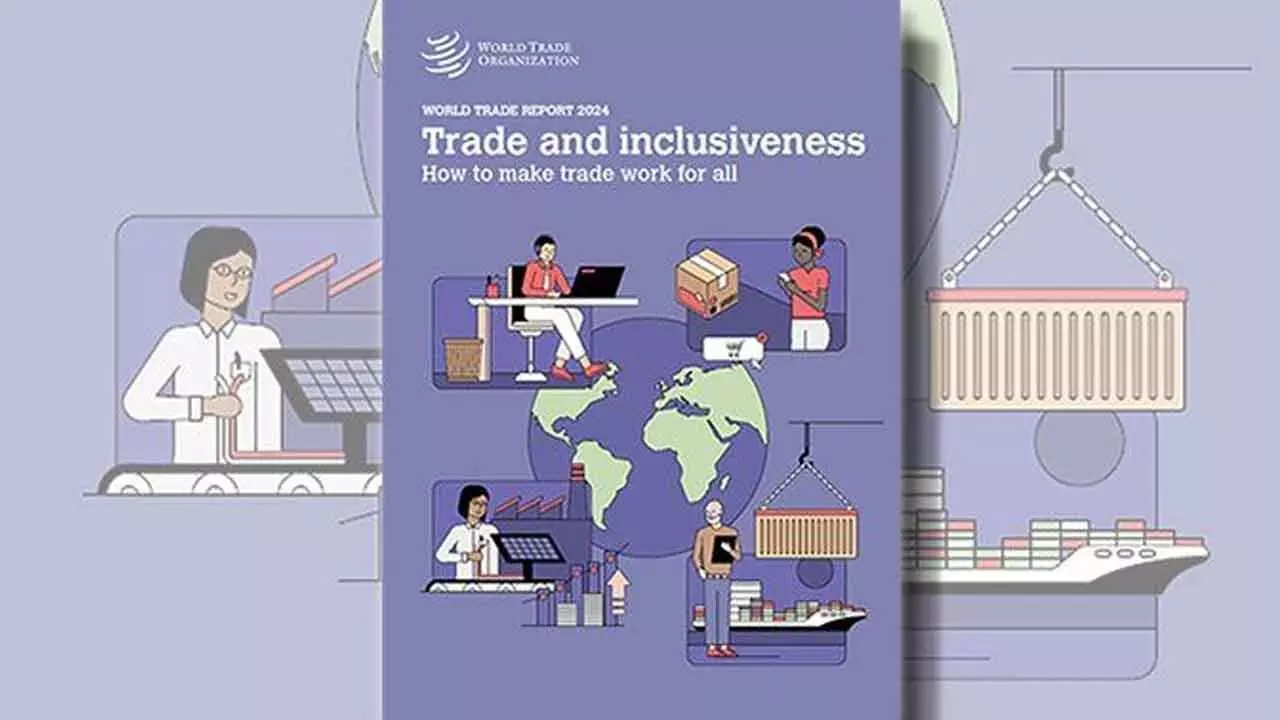Trade And Inclusiveness: WTO Report 2024 Is Bang On; All Economies Should Take Cue
Fairness in tariffs and duties and openness of exim policy will be critical for international trade growth
Trade And Inclusiveness: WTO Report 2024 Is Bang On; All Economies Should Take Cue

Free trade may lead to better pricing, one that all income groups can afford thereby leading to inclusiveness. The report opines that lower priced imports will lift the purchasing power, especially at the bottom of the income distribution
Imports and exports that determine international trade are crucial for a county's economic growth. Along with the domestic trade, commerce, industries, services, the reach of the country to international markets in terms of trade and commerce adds to the GDP, while also ushering in its economic prosperity.
In the current interconnectedness of countries, free movement of goods and services contributes to the global trade, thereby adding value to both countries.
Globalisation has opened the floodgates to prosperity, while effectively bridging the gap between advanced and developing countries, especially low-income and less developed countries. This can be further bridged by way of trade and opening the economy for free trade with relevant facilitative policies.
The current trend of restrictive policies towards international trade particularly after Covid-19, focussing more on domestic market and favourable policies towards domestic players may be considered favorably in the short term, but in the long term it will not succeed and may become a deterrent for sustained or enhanced growth.
Openness, transparent policies that draw international players to invest, adoption of modern technology, research and development of new patents and new high-end products and services will help in increasing domestic value and thereby boost share of international trade growth.
Fairness in tariffs and duties and openness of exim policy will be critical for international trade growth.
The 2024 edition of the World Trade Report presents a strong evidence that trade has played a crucial role in narrowing the income gap between economies since WTO was established 30 years ago. It is a fact that the more a country opens the economy, more the opportunities for domestic players to reach out to international markets while global players enter such countries. The report therefore is of the view that international trade's role in supporting inclusiveness has led to reduction in the income gap between economies. The WTO study disproves the current thinking in some quarters that trade is not good for poverty or for poor countries as they tend to create an unequal world.
We need to enhance competitiveness of domestic players with suitable openness policies towards international trade as any excessive support given to domestic players without opportunity to international players participation, may lead to inefficiency. This may also result in less focus on improving quality of products and services, which the country cannot afford.
On the contrary, free trade may lead to better pricing, one that all income groups can afford thereby leading to inclusiveness.
The report therefore talks over the past three decades, open global markets, underpinned by the WTO, gave rise to a boom in trade, enabling the productivity gains that came with greater specialisation, scale and competition. The report opines that lower priced imports will lift the purchasing power, especially at the bottom of the income distribution. There are successive stories of developing economies with domestic policies promoting international trade, which has led to a sharp increase in their share of international trade. The report finds that with strong income growth in low and middle income economies, the proportion of their populations living in extreme poverty fell from 40 per cent in 1995 to 11 per cent in 2022.
Analysis further found that trade policy reforms played an important role in the growth story of such countries. Trade cost reductions increased global real GDP by 6.8 per cent between 1995 and 2020 and by 33 per cent in low-income economies. WTO further states that economies, which took more on reforms and liberalisation commitments as part of their WTO accession negotiations, saw a 1.5 per cent point boost to their annual growth rates and attracted more capital investment.
There is enough evidence to suggest that protectionism is not an effective path to inclusiveness. In this period of global cooperation and collaboration, restricting trade will not necessarily lead to equality of growth. In fact, this could be a dampener to innovation and competitiveness.
The report states that restricting trade is typically an expensive way to protect jobs for specific groups within society. They can raise production costs while inviting costly retaliation from disgruntled trading partners.
Quite understandably, the WTO propagates the ‘re-globalisation’ idea to bring more economies and communities from the margins to the mainstream of the global economy as they can attract more trade-oriented investment. Digital delivery of services and environmental goods offer exciting opportunities as they will open opportunities for underrepresented economies, small businesses and women entrepreneurs to connect with international markets.
According to Dr. Ngozi Okonjo-Iweala, Director-General of WTO, " In an era when global supply chains exhibited some vulnerabilities , deconcentrating and diversifying them to business friendly but underrepresented regions and economies can be part of fostering inclusiveness, while also building global resilience "
Covid-19 led to slowness in income convergence and, in fact, went into reverse during the pandemic, which had hit the growth in poorer economies hardest. The other challenges like geopolitical tensions, the technological revolution and climate change pose a significant risk to economic convergence, both in terms of unwinding past achievements and future prospects, states WTO. It is therefore imperative for more inclusivity in terms of international trade and there is a need to do more domestically and internationally to achieve a vibrant and robust inclusive global trade.
(The author is former Chairman & Managing Director of Indian Overseas Bank)

